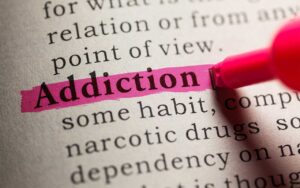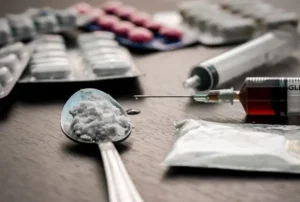Addiction affects millions worldwide, transcending age, gender, and socio-economic status. It’s not just about battling substances; it’s a complex interplay of psychological, physical, and social factors. This blog aims to demystify addiction, providing the definition, impacts, and the journey toward recovery. So, whether you are struggling personally or supporting someone who is, understanding addiction is the first step toward freedom.
Contents
What Defines an Addiction?
 Addiction is defined by an intense focus on using a certain substance or engaging in a behavior, despite the negative consequences it may bring. This dependency can manifest as a physical compulsion, where the body experiences withdrawal symptoms in the absence of the substance or a psychological need. Common examples include addiction to drugs, alcohol, nicotine, gambling, and even internet use.
Addiction is defined by an intense focus on using a certain substance or engaging in a behavior, despite the negative consequences it may bring. This dependency can manifest as a physical compulsion, where the body experiences withdrawal symptoms in the absence of the substance or a psychological need. Common examples include addiction to drugs, alcohol, nicotine, gambling, and even internet use.
The critical aspect that distinguishes this from simple habits or occasional indulgence is the loss of control over the activity and its continued use despite its harmful effects. Addictions alter the brain’s natural reward circuits, increasing the desire for the substance or behavior. This change in brain chemistry makes overcoming this condition a challenging process that often requires professional intervention and ongoing support.
What Are The 4 Areas of Addiction?
The four key areas of addiction typically refer to the aspects of life that are most affected by addictive behaviors. These areas are:
Biological
Addiction fundamentally alters the brain’s chemistry and functioning, affecting neurotransmitters and pleasure centers. This leads to physical dependence and withdrawal symptoms, making the substance or behavior seem necessary for normal functioning.
Psychological
This impacts mental health by fostering an intense and often compulsive need to engage in addictive behaviors. It is associated with a range of psychological issues such as anxiety, depression, mood swings, and personality changes. Often, these behaviors are used as a coping mechanism to deal with stress, trauma, or other underlying psychological issues.
Social
Addiction can severely impact an individual’s relationships and social interactions. It often leads to social isolation, problems at work or school, and strained relationships with family and friends. Additionally, it can lead to behaviors that are destructive or detrimental to social connections, such as lying, stealing, or aggressive behavior.
Spiritual
Although not always addressed, the spiritual aspect of addiction involves a sense of loss of meaning or purpose in life. Individuals may feel disconnected from their values and beliefs, or feel a deep sense of guilt and shame. Recovering this spiritual connection is often an important part of many recovery programs, such as those incorporating 12-step principles or other holistic recovery approaches.
Addressing all four areas is crucial in comprehensive addiction treatment programs to ensure a balanced and effective recovery process.
What Are The Most Common Types Of Addiction?
 Addiction can manifest in various forms, impacting individuals across all walks of life. Here are some of the most common types:
Addiction can manifest in various forms, impacting individuals across all walks of life. Here are some of the most common types:
Substance Addictions
- Alcohol Addiction: Dependency on alcohol, often characterized by an inability to manage drinking habits despite adverse effects on health and life.
- Drug Addiction: This includes illegal drugs (like heroin, cocaine, methamphetamine) and prescription medications (such as opioids, benzodiazepines). It can develop from both recreational use and prescribed use.
- Nicotine Addiction: Dependency on tobacco products, which is one of the most common forms of chemical addiction worldwide.
Behavioral Addictions
- Gambling Addiction: Compulsive gambling is the uncontrollable urge to keep gambling despite the toll it takes on one’s life.
- Internet Addiction: Excessive use of the internet that interferes with daily life. This can include gaming, social media, and other online activities.
- Shopping Addiction: Also known as compulsive buying disorder, where there is an uncontrollable urge to shop to feel good.
- Food Addiction: Often linked to binge eating, this addiction is characterized by compulsive eating habits that negatively affect one’s health.
Sexual Addictions
- Pornography Addiction: Compulsive use of pornography at the expense of personal, family, and professional responsibilities.
- Sex Addiction: Engaging in persistent and escalating patterns of sexual behavior despite increasing negative consequences to one’s self and others.
Each type has unique characteristics and requires specific approaches for treatment and recovery. Understanding the specific nature of addiction is crucial in providing effective support and interventions.
How Common Is Porn Addiction?
Pornography addiction is increasingly recognized as a significant issue, particularly in the context of readily accessible online content. While precise statistics can be challenging to determine due to the private nature of the issue and varying definitions, it is clear that a substantial number of individuals report behaviors consistent with addiction.
Studies and surveys have suggested that anywhere from 5% to 10% of the adult population might struggle with some level of problematic pornography use. The anonymity and easy accessibility of internet pornography have contributed to its widespread use and potential for compulsive behaviors.
The prevalence of this condition has also drawn attention from researchers and mental health professionals due to its impact on individuals’ psychological health, relationships, and overall quality of life. As public awareness of this issue grows, more resources and treatment programs are being developed to address pornography addiction.
How Can I Overcome Addiction?
 Overcoming addiction is a challenging yet achievable goal, often requiring a multifaceted approach tailored to the individual’s specific needs. Here are key steps and strategies that can help in the recovery process:
Overcoming addiction is a challenging yet achievable goal, often requiring a multifaceted approach tailored to the individual’s specific needs. Here are key steps and strategies that can help in the recovery process:
Acknowledge the Problem
Recognizing that you have an addiction is a crucial initial step in the recovery process. This often involves confronting denial and acknowledging the negative impacts the addiction has had on your life and the lives of those around you. Acceptance empowers you to take responsibility for your actions and creates a foundation for change.
Seek Professional Help
Specialists in addiction medicine or psychology can provide comprehensive assessments and tailor a treatment plan that addresses your specific needs. Professional help might also include ongoing support through therapy sessions, which can equip you with tools to manage your addiction effectively.
Consider Treatment Options
Various treatment modalities are available depending on the severity and nature of the addiction:
- Detoxification helps manage physical withdrawal symptoms and is often the first step in drug addiction treatment.
- Rehabilitation programs, which can be either residential or outpatient, provide structured therapy and support.
- Therapy sessions, including cognitive-behavioral therapy (CBT). And, help modify your thinking and behavior patterns.
- Medication may be used to manage withdrawal symptoms, prevent relapse, or treat concurrent mental health conditions.
Build a Support Network
Recovery can be strengthened through support from others who understand the challenges of addiction. This might involve family and friends who offer emotional support, as well as peer support groups like Alcoholics Anonymous (AA) or online support communities. These networks provide a sense of belonging, accountability, and motivation.
Develop New Habits and Interests
Engaging in new activities can fill the void left by addiction, reducing the risk of relapse. Activities like sports, hobbies, or volunteering not only improve physical health but also boost self-esteem and provide a sense of purpose and community.
Manage Triggers and Cravings
Identifying and managing triggers—an essential part of recovery—requires you to understand the environmental, emotional, or social cues that might tempt you to relapse. Techniques such as mindfulness, meditation, or therapy can be effective in managing these cravings and maintaining sobriety.
Maintain a Healthy Lifestyle
A healthy lifestyle supports recovery by improving your physical and mental health. Regular physical activity, a nutritious diet, and sufficient sleep can improve your mood, reduce anxiety and stress, and enhance your overall energy and well-being.
Continuous Learning and Self-Reflection
Recovery is a lifelong process of personal growth. Continuous learning and self-reflection help you understand the underlying reasons for your addiction, recognize progress, and make necessary adjustments to your recovery strategy. Journaling, therapy, and mindfulness practices are excellent tools for this ongoing process.
Prepare for Setbacks
Relapses, or setbacks, can occur during recovery. It’s important to view them not as failures but as opportunities to learn and strengthen your commitment to sobriety. Developing a plan for dealing with relapses can help you get back on track more quickly and effectively.
By thoroughly addressing each of these areas, individuals seeking to overcome this condition can enhance their chances of sustaining long-term recovery and leading a healthier, more fulfilling life.
Conclusion
In conclusion, overcoming addiction is a journey that requires acknowledgment, professional guidance, and a supportive network. It involves exploring various treatment options, embracing new activities, and learning to manage triggers effectively. Maintaining a healthy lifestyle and engaging in ongoing self-reflection also play crucial roles in sustaining recovery.
Although facing setbacks can be part of the process, it’s important to view them as opportunities for growth. With dedication and the right resources, individuals can navigate the path to recovery and reclaim control over their lives, leading to lasting change and well-being.
